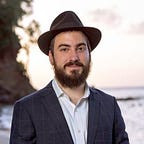I’m in Kazakhstan for Less Than Twenty-Four Hours
This afternoon, I landed in the former Kazakh capital of Almaty as part of a Chabad delegation to the central Asian republic.
With borders still shuttered due to the pandemic, Chabad Chassidim and rabbis received special permission for a small group to enter the country (for less than 24 hours) on a chartered flight, for which I am grateful to have been sponsored a seat.
Now, you may be wondering, what brings a Caribbean rabbi to Kazakhstan, the world’s largest landlocked country?
Today is the 20th of the Hebrew month of Av, which marks the 77th anniversary of the passing of Rabbi Levi Yitzchak Schneerson, our Rebbe’s saintly father.
Born in 1878 in the small Belarussian town of Poddobryanka, at the age of 30, Rabbi Levi Yitzchak was appointed chief rabbi of Yekaterinoslav (today Dnipro, Ukraine).
In 1939, he was dismissed from his post as chief rabbi and arrested by the KGB. The communist government accused him of anti-Soviet activities, including regular communication with his son (the future Rebbe) and creating a clerical underground, amongst other “crimes.”
Over the next year, he was brutally tortured and interrogated in Stalin’s prisons. He was then sentenced to five years of exile and deported to the remote Kazakh village of Chi’ili.
Once in Chi’ili, he and his wife, Rebbetzin Chana, rented a room in a small mud-brick house with a sand floor. Still, according to Rebbetzin Chana, what plagued her husband most was not the terrible living conditions but rather the lack of ink and paper to write his Torah thoughts.
Five horrendous years later — which left him critically ill — Rabbi Levi Yitzchak and his wife moved to Alma-Ata (today Almaty). The local Jewish communities were elated to have the great Kabbalist in their midst; thus, he quickly became their spiritual leader.
Rabbi Levi Yitzchak only lived in Almaty for a few months, but his impact was felt throughout the city.
As Rebbetzin Chana would later write:
“My husband had lived there so briefly — less than four months — during part of which time he lay critically ill. Yet, he drew in people so closely that they became deeply devoted to him. To accomplish this, he clearly had to possess special qualities.”
On the 20th of Av, 5704 (August 9, 1944), Rabbi Levi Yitzchak Schneerson passed away and was interred in the local Almaty cemetery.
After the passing of her husband, Rebbetzin Chana penned the following entry in her diary:
“This is how his life ended. His path through life was a difficult one. He was always at war, never compromising his convictions, never going ‘fifty-fifty.’ It cost him dearly, but he never surrendered. At first, this made him many opponents, but eventually, they became his followers and loyal friends.”
Under the repressive Soviet boot, while enduring unspeakable horrors, Rabbi Levi Yitzchak authored some of his most profound Kabbalistic teachings. More than a decade after his passing, the manuscripts arrived on the United States’ shores and were eventually published in the 1970s. Recently, selections of his writings were translated into English as well.
Last year, his gravesite was declared a Kazakh National Heritage site in cooperation with the U.S. Commission for the Preservation of America’s Heritage Abroad.
It’s a tremendous privilege to spend 24 hours with my colleagues from around the world, and pray at the Ohel (resting place) of Rabbi Levi Yitzchak, study his Torah writings, be inspired by his life and dedication to the preservation of Judaism.
I’ll be taking this inspiration back to our island home, where we are free to practice Judaism without oppressive regimes or even bad Russian weather.
